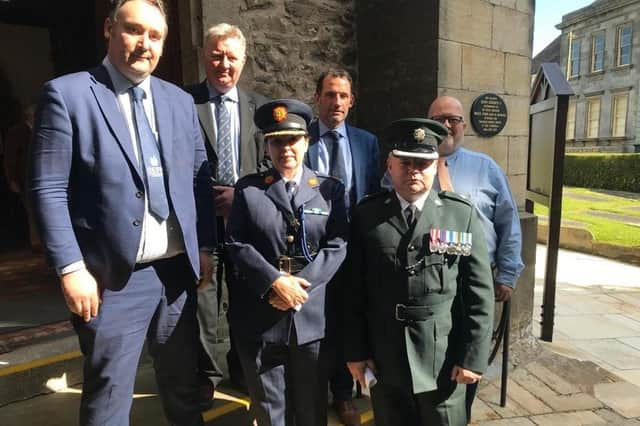Victims' group SEFF celebrates 25 years with service in St Macartin’s Cathedral in Enniskillen


A service was held in St Macartin’s Cathedral in Enniskillen on Sunday to reflect on the years of work the South East Fermanagh Foundation (SEFF) has done in supporting victims and survivors of violence in Northern Ireland.
The event is not being held on August 13, as has been intended, as the group did not want to distract from a service being held to mark the 25th anniversary of the Omagh bomb, according to the group’s director.
Advertisement
Hide AdAdvertisement
Hide AdKenny Donaldson also accused the UK and Ireland of overseeing “a process of appeasement of terrorism for 25 years plus” which has “brought us to where we are today”.
Mr Donaldson said that SEFF, formed on August 15 1998, had grown from one full-time staff member in 2003 to 33 staff more than two decades later.
“Many of the innocent victim/survivor-focused support groups were established in the same year as Omagh, which was also the year of The Belfast Agreement, signed on Good Friday,” he said.
“Omagh was said to mark a watershed moment when society moreover understood the absolute need for violence not to grip our society as it had in the past.
Advertisement
Hide AdAdvertisement
Hide Ad“Twenty-nine innocent people from across the community and unborn twins had their lives prematurely ended, never able to experience the relative peace that came to Northern Ireland and that is an issue that grieves us, but particularly their families – and, of course, sadly others continued to be murdered post the events of Omagh with terrorism seeking to enforce its will upon the community of this place and beyond.”
He cautioned against dividing society into Protestant and Catholic camps and instead look at those who seek to use or justify violence and those who oppose it.
“Northern Ireland is a tale of two sets of experiences. Some have enjoyed a significant ‘peace dividend’ and life is undoubtedly better across many measures and criteria.
“In this Northern Ireland people are increasingly at ease with themselves and each either, integration is becoming commonplace and they feel they are in a post-‘conflict’ time.
Advertisement
Hide AdAdvertisement
Hide Ad“However, for others, Northern Ireland has not changed substantively. For those innocents who been directly impacted by the violence there has been reduction in the cycle of injustice that they have experienced.”
He added: “Many don’t want to talk about this second Northern Ireland which has been allowed to persist and for those of us who dare, the unscrupulous and naive seek to portray us as anti-peace, problem children and bitter.”
He reiterated his group’s opposition to the UK government’s Legacy and Reconciliation Bill, stating that it is the “opposite” of victim centred.
It would also prevent future civil cases and inquests.
The controversial legislation would give immunity from prosecution for Troubles-related offences to people who co-operated with the ICRIR (Independent Commission for Reconciliation and Information Recovery).
Advertisement
Hide AdAdvertisement
Hide AdThe bill is opposed by all major Stormont parties, the Irish government and victims’ campaign groups, prompting several protests against its passage through Westminster.
Mr Donaldson said: “The legislation as promoted could well disempower the individual and many have indicated that it would turn back time in redefining their status as ‘victim’ once more, for to be a survivor and to thrive there must be the existence of hope and an assuredness that right will prevail.
“Our message is clear as we mark 25 years of service to innocent victims and survivors of terrorism and other Troubles-related violence, but also the broader community – there is much more to be done and we need people prepared to journey with us.”